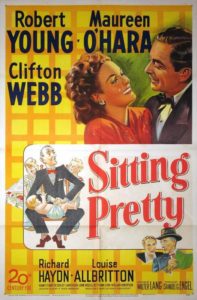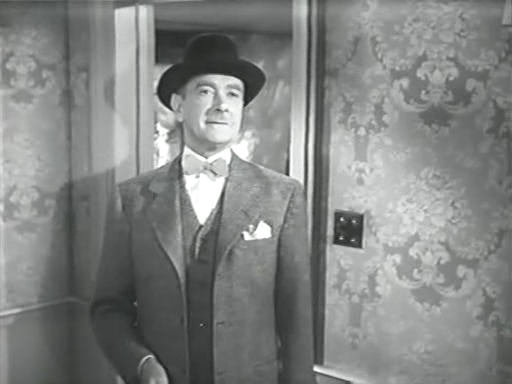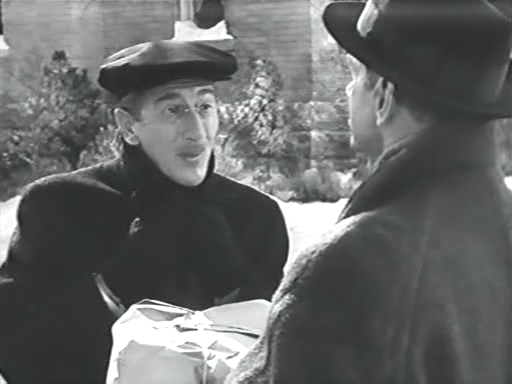Sitting Pretty (1948)
“I dislike children intensely — and yours, if I may say so, have peculiarly repulsive habits and manners.”
|
Synopsis: |
|
Genres, Themes, Actors, and Directors:
Review: Given that Mr. Belvedere is decidedly asexual (or, depending on how you look at it, secretly “coded” as homosexual), the fact that the film’s storyline eventually hinges on Robert Young’s jealous suspicions that his wife is engaging in a romantic dalliance with her nanny is simply ludicrous. Yet such narrative quibbles are somehow easily forgiven, given the overall outlandish flavor of the screenplay — which eventually takes an unexpected twist that places the entire story in a new context. And Webb is given so many delicious lines to spout that it’s pure fun simply waiting to hear how he’ll handle the next one. Watch for an enjoyable supporting turn by British comedic actor Richard Haydn (who played a dramatically different character in Preminger’s Forever Amber the previous year). Note: This film (or rather, Webb’s impersonation as Mr. Belvedere) was so popular that two sequels — Mr. Belvedere Goes to College (1949) and Mr. Belvedere Rings the Bell (1951) — quickly followed; while they get half-hearted ratings, I’ll admit I’m smitten enough by Webb-as-Belvedere to want to check them out. UPDATE, 12/9/11: I recently watched Mr. Belvedere Goes to College (1949) on YouTube (some kind soul uploaded it there), and thought I would write a quick capsule review here (especially given that no reviews at all are linked to this obscure little title on IMDb). As expected, it’s not nearly as “complete” a comedy as Sitting Pretty, and certainly isn’t must-see viewing for film fanatics — but fans of Webb won’t regret checking it out. His “Lynn Belvedere” remains in peak form in the sequel, responding to the rhetorical question, “You’re not serious…?!” with a resolute, “I’m grim.” (Only HE could make that retort sound convincing!) The film’s title explains itself: given that his formal education apparently consisted of no more than “two revolting weeks of Kindergarten”, Belvedere decides — for reasons I can’t name without spoiling the first picture a bit — to finally get a college degree. This allows the filmmakers ample opportunity to expose the hazards of freshman hazing — to which, interestingly enough, Mr. Belvedere allows himself to be subjected (to a certain extent, anyway). Unfortunately, far too little time is actually spent on Belvedere’s travails in the classroom; NONE, actually (we simply see him reading books wherever he goes). Instead, a rather insipid subplot is allowed to dominate the proceedings, involving a would-be romance between a grown-up Shirley Temple (whose annoying character possesses a significant secret identity) and Tom Drake (of boy-next-door Meet Me in St. Louis fame); as might be expected, whenever this narrative takes center stage, things grind to a deadening halt. Enter Mr. Belvedere again, however, and one’s energies are immediately restored: he’s just THAT delightful. As Bosley Crowther laudingly describes him in his review for the New York Times, he’s “brilliantly, classically clever and often delightfully droll, but he is also profoundly earnest”; in sum, he’s “a fellow who knows himself thoroughly and who has the good sense to realize that modesty would be false”. Indeed. Redeeming Qualities and Moments:
Must See? Categories Links: |



3 thoughts on “Sitting Pretty (1948)”
Agreed – a must for Webb’s performance.
The average viewer may take ‘SP’ on a surface level, as a variation on the nanny theme. And it works on that simple level, with Webb’s staid, “Spartan” manner adding a welcome twist to perceived gender roles.
But, being a gay man – and knowing both Webb and Haydn were actually gay – I can only see this as a movie about a good homosexual and a bad one. (Well, for the most part; I’ll get to that.)
In real life, Webb was apparently inordinately devoted to his mother and lived with her until her death at age 91. He then died not all that long after at age 77. It’s striking (as a sidebar) that, in the first moments of ‘SP’, we see Haydn’s character (not Webb’s) in Webb’s life situation.
The life of Haydn’s (somewhat mincing) character is rather pathetic – not so much because he’s a mama’s boy as much as the fact that he is the town gossip (and a fair number of people in the town dislike him for that). Haydn’s character’s approach to life is ultimately destructive. Though the self-contained, self-satisfied element of Webb’s Belvedere may make him pathetic on a different level, the character (who ‘happens’ to have what could be a woman’s first name, but I’ll let that pass) is served up in a constructive (somewhat butch; at any rate, only very quietly mincing) manner and used for comic effect. (As the parents, O’Hara and Young don’t really care how off-putting Belvedere seems – as long as he continues getting results with their unruly children, which he very clearly does.)
Indeed, many of the things he says are humorous, and more biting in an acidic way than wildly funny. But if there is any real heart to Belvedere, it’s kept safely hidden. (Note one of the rare instances in which Belvedere makes a grand gesture: he returns O’Hara’s kindness of a birthday gift by buying the family a bird.) Belvedere’s seemingly endless achievements in life make for an effective running joke as well. But, as smart as he is, he’s also snotty and generally like a well-behaved bitch.
[SPOILER ALERT:]
Nowhere is that more evident than in the film’s conclusion – in which (and here’s where he’s a semi-bad homosexual himself) he manages to embarrass the entire town on a nationwide level by writing a tell-all novel with the town’s actual name as the title (not even Grace Metalious did *that*) and then washes his hands of any blame by turning Haydn over to the townsfolk as the real culprit, for making all of the underbelly information (indirectly) accessible to him.
So, basically the film builds to a showdown between two gay men – one figuring out how to make life work in nothing but his favor, and the other lashing out at life in a rather passive-aggressive manner. I can’t imagine the suburbs were all that satisfying for gay men in the late ’40s. But so much for a light comedy!
It’s clear that I don’t view this film on the ‘cute’ level that is its main intent. In truth, to see it on that level, the film wouldn’t mean all that much to me, aside from the quiet command of Webb’s assured performance. I mean, it’s pleasant, but on the surface it’s simple sit-com overall.
On another note: it’s interesting that a film ostensibly about a nanny coming and “taking charge” in an unruly household doesn’t really focus very much on the specifics of how he manages this turn-around — an episode of “Supernanny” this is NOT! The kids barely register as characters.
I was thinking the same thing. It’s shown to us as if we don’t need the specifics; as if Belvedere enters, et voila, the children are mesmerized and more than happy to do his bidding. (After all, the older son does say, “I think he’s kinda cute.” Cute?)